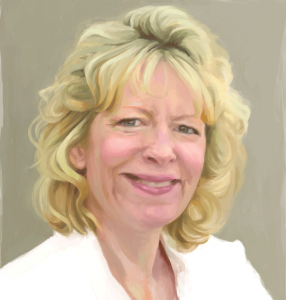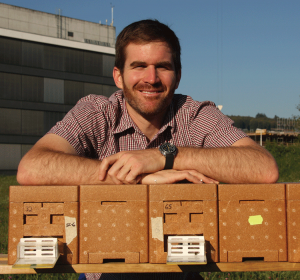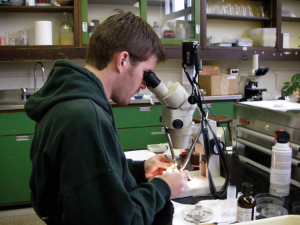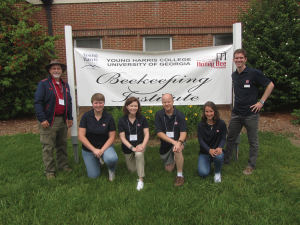By: Jennifer Berry
Legend has it that back in the 17th century, an “aha” moment occurred when a young scholar, Sir Isaac Newton, was struck on the head by an apple while sitting under a tree. That is supposedly when gravity was discovered. Think about all the other amazing “aha” moments that have happened throughout time that have changed so many lives. I’m sure everyone has had at least one of these moments in their lifetime; mine occurred the first time I lifted a frame out of a honey bee colony. Geoff Williams’ was a little more entertaining.
Geoff and I both agree we’ve met at some beekeeping meeting years ago, but which one, who can remember? We got reacquainted earlier this year when I approached him about collaborating on an East Coast trial testing this oxalic acid extended release method that Randy Oliver has been chatting about over the internet. After much discussion, between us and others, plans were put into place for a large field trial. With the size of the study (400 colonies), it was great news that Geoff agreed to be a part of the study. He and his crew, Selina Bruckner, Emily Muehlenfeld, Augusta Thumond, Cody Hill and Adler Salem were awesome and really fun to work with. However, there was just one problem, they were from that other little university in Alabama. Yet, for the sake of the bees, I overlooked this one issue, and concentrated on the study at hand. And technically, Geoff wasn’t from Alabama, so that helped a bit. He actually grew up in Alberta, the Western Province of Canada, in the small, “misnamed” town of Red Deer. The town was named after the “red deer” that inhabited the area; however, this red deer turned out to be elk. Guess the European explorers who named the town weren’t up on their Elk-ien taxonomy.
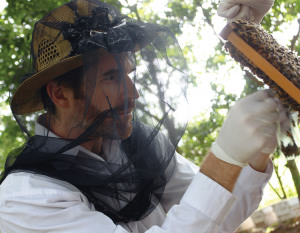
Geoff inspecting a frame in Thailand. ‘I’ve been very fortunate to travel to many locations because of honey bees.’
Geoff’s beekeeping story began after he received his undergraduate degree in Biology from the University of Alberta. His area of interests were ecologically based, including entomology and parasitology, but upon graduation, he was still wondering what to do next. “Maybe I could study parasitology and investigate tape worms in gorillas, or entomology and study ticks on giant elk, but that’s probably not going to happen, I’ll end up just studying something boring like lice on birds.”
As you can see, he had lots of interests, sure, but what was the path that would lead to a job, an amazing career and fulfillment in life? Since he was struggling with his future prospects, it sounded like the perfect opportunity to take some time off from school and travel the world. That’s when he and a buddy headed off to Europe and Africa; where his appreciation for entomology grew, while watching massive dung beetles traverse along the road sides.
After his year-long travels, he decided it was time to buckle down; he met up with Nova Scotia’s former provincial apiarist, Dick Rogers. Dick had started his own company which conducted studies for private labs, investigating new crop protection products for registration purposes.
Geoff decided to give this new job a try for a month and see if he liked working in the back woods of Minnesota, while staying in cheap hotels and eating random, local cuisine. But shortly after he started, he received the NSERC Industrial Post Graduate Scholarship, which ended up being a pretty sweet deal for Geoff. The money to support graduate students came from private industry and the government. The company in which he was working kicked in a percentage as well. The scholarship provided the perfect opportunity for him to start his Master’s program in which Dick became a co-advisor.
Geoff decided on Acadia University, in Nova Scotia, with his thesis work comprising of comparative studies between the effects of Nosema apis and Nosema ceranae. Only catch, the university he was planning on attending, was 3000 km away from his hometown. For us “United States” Americans, that’s roughly 1800 miles. So, he packed up his old 1990 Dodge Ram 50 truck (basically an El Camino), headed east while listening to tunes, sleeping in dubious camp grounds and eating Spitz, you know those lovely flavored sunflower seeds (which I had never heard of, must be a Canadian thing, eh?)
During Geoff’s time at Acadia University, he continued working for Dick. This work provided all sorts of experiences, one in particular was the Summer he worked in Yuma, Arizona. Now 75% of all honey bee colonies in Canada are located in the Prairies, where he grew up, but prior to Yuma, he had never been stung. That was about to change.
The study involved working with Africanized Honey Bees (AHB’s) along the border of Mexico. For those of you that have not had the privilege to work these bees, I can tell you from experience, it is not easy. First, you must park miles away from the apiary, otherwise the vehicle you arrived in, will be full of bees. Next, you must duct tape every and any possible opening, otherwise the bees will find it and light you up from the inside. Your boots are taped to your legs, your gloves are taped to your arms, and you better have a veil zipped to your jacket or suit, with the end of the zipper taped as well. A tie down veil is no match to the aggressive and industrious behavior of AHB’s.
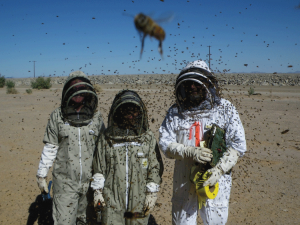
During my graduate years working AHB’s in Yuma (L-R): Bee Researchers from Acadia University Cate Little & Lise Charbonneau and Dick Rogers (Bayer Bee Care Centre).
Ok, that’s bad enough, but it’s summer time in Yuma, Arizona where daytime highs only top off around 110 – 120°F. Even the most dedicated of southern beekeepers would find that difficult working conditions, but for two snow birds from Nova Scotia; I’m surprised they survived. Aha, but of course they figured it out. Alarms would go off before sunup so they could be in the apiary first thing in the morning. Then they could only work for three hours before being completely bagged (Canadian word for worn or wiped out, totally exhausted or done). However, they would always be able to regain their strength after eating several tacos in the comforts of AC at a favorite Mexican restaurant. Once full and rehydrated, it was time for a siesta. Then later in the day it was back at it till sundown.
Now, occasionally there was time to take field trips across the border to visit flea markets and such. One thing Geoff noticed while walking around the streets of those small towns, was the number of dentist offices. They seem to inhabit every corner. Another observation he made, was the number of pharmacies peppered about, all advertising this bluish-green liquid. It dawned on him one day what this concoction was – liquid Viagra. As he explained this little section of the story he repeatedly laughed while saying, “but I never tried it.”
Even after the grueling Yuma experience, Geoff continued working with bees and commercial beekeepers. One study in particular, he would assess the quality of bees after pollinating certain crops. Meanwhile, he was still involved with his studies, and after two years decided to convert his Master’s research into a PhD program at Dalhousie University, in Nova Scotia.
The next two years he continued with his studies, but as before, another cross road was about to occur, graduation. Then what? Geoff began exploring possibilities prior to his completion. Randomly, he sent an email to Dr. Peter Neumann, about a post doctorate position at his lab in Bern, Switzerland. Six months later Geoff and his wife Stephanie (who he had met back at Acadia University and had just completed her Master’s degree), were heading to the Swiss Confederation. They decided to live in Fribourg, but they formed a pact first. Since Fribourg was close to where Stephanie was going to pursue her PhD, and Geoff would have to commute an hour each way to Bern, the deal was, Stephanie would have to cook. Not too bad of a deal, I guess.
Sending that email to Dr. Neumann proved to be an excellent move on Geoff’s part. For the next five years, his career in honey bee research would blossom. He started his Post Doctorate work for Agroscope, a Swiss bee research center funded by the federal government. His work would eventually lead into a position at the University of Bern.
He couldn’t believe his luck when he first walked into the bee research facility. This was an actual “world class” lab, equipped with all the normal “world class” lab stuff, plus, there were technicians and personnel there to assist. Lots of folks, lots of diverse backgrounds, which was awesome. But best of all, there was an apiary with bees. While in Nova Scotia, Geoff worked with lots of beekeepers, since an apiary didn’t exist at the university. This wasn’t a bad thing but now he had easy access to bees in the backyard.
While in Switzerland, his research focused on the interactions with parasites and pesticides on honey bees. He not only conducted his own research but also helped graduate students, Gina Retschnig, Aline, Troxler, Lars Straub and others, with their projects as well. He was also instrumental in coordinating COLOSS (Prevention of honey bee colony losses).
After five years working and studying, which was an amazing opportunity for both Geoff and Stephanie, it was time for Geoff to make another life decision. An assistant professor position at Auburn University had become available. What a huge break, a full time, tenured track job, researching bees. Since he was unclear how long his contract at Bern University would last, the timing was perfect, yet, leaving Switzerland was going to be tough. The lab and all the amazing friends, the awesome mountains, rivers, landscapes, people, swimming, skiing, were all going to be missed. But, with instability hanging over his head, and both of them missing North America and the English language, they realized it was time to go. The timing was also perfect for Stephanie as well. She had just completed her PhD, so, not only did Geoff get the Assistant Professor position, she acquired a teaching position in the Geosciences Department – just icing on the cake!
Geoff’s lab is located on campus at the western isolated edge of Auburn University. The lab looks like most university buildings built back in the 60’s: classic cinderblock. Years back it housed bee researchers George Bake and Jim Cane but no one since. Right now, Geoff shares the space with a fire ant researcher, but the lab is located on “Bee Lab Road”, so it’s only a matter of time before the more socialized of the hymenopteran clan takes over. Plus, Auburn has kicked in money for new windows, painting etc. to help out their new professor.
Another plus, while in Switzerland, he worked with Selina Bruckner who was wrapping up her Master’s program about the time Geoff was heading to the US. He was able to convince her to move from Switzerland, her home land, to the hot, humid, southern state of Alabama. Selina is now Geoff’s PhD student and has been very instrumental in our oxalic acid project (which I will write about next year since we are still trying to sift through 400 colonies worth of data). Anyway, he still scratches his head on how he worked that deal.
As Geoff put it, “If I have any say, I’ll continue with honey bee research. Bees are so charismatic and amazing. I love working with them and those that keep them as well.” He feels this job at Auburn has given him a wonderful chance to not only to work with students, but to work with other folks (research and commercial) in the industry, as well.
There are many future projects on Geoff’s mind, several of which include extension work, however, his appointment at Auburn only comprises teaching and research. There is no extension appointment, but working with beekeepers in the past was a real highlight for Geoff, so he plans to keep that in the mix. It’s a good thing that Geoff had that “aha” moment years ago, not only for the bees, but also for the beekeepers.
Ok, so what was that “aha” moment? When he was backpacking through the wilds of Africa, he and his buddy would find themselves traveling in the back of pick-up trucks. One day, while hanging on, and peering over the top of the cab, BAM! Geoff was struck in the forehead by a huge dung beetle. As he wiped his forehead he thought for sure he would need stiches, but instead, the beetled beast only left a large welt. While interviewing Geoff for this issue, I thought, maybe that was his “aha” moment, since that trip, those beetles, the overall experience, may have been what cemented in his mind the idea that bugs were going to be an instrumental part of his life.
Alabama, you should be thanking those dung beetles for smacking “entomology” into the head of Geoff Williams. From what I’ve observed at meetings and getting to know him better while working in the field and over the phone, he’s a good guy. He’s enthusiastic, intelligent, and generous with his time, plus, his heart is in the right place. He truly cares about beekeepers and these little creatures we call bees. I hope you support your new Apiculturist because he’s an amazing addition, not only to Auburn University and the south, but to our little world of beekeeping. Aha!
Jennifer Berry is the Research Leader at the University of Georgia Honey Bee Lab.





